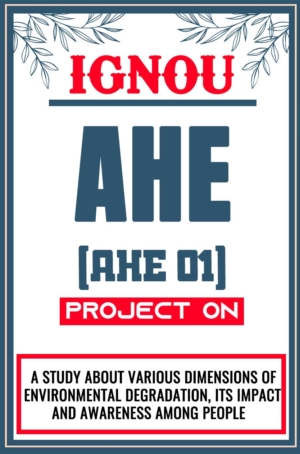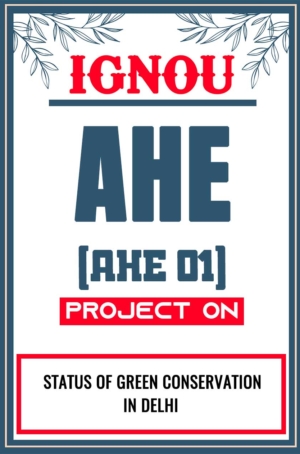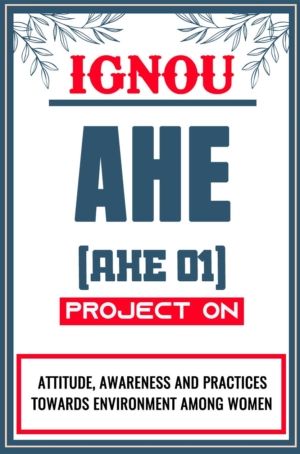Download IGNOU AHE Project (AHE-01)
The IGNOU AHE (Application Oriented Course in Human Environment) Project (AHE-01) is designed to provide students with an understanding of the human environment, addressing various environmental issues and their management.
In the course ” Application Oriented Course in Human Environment (AHE)”, we will explore the significant influence of the environment on the majority of individuals in contemporary society. Every learner of the AHE program is required to complete the IGNOU AHE 1 PROJECT independently. The IGNOU AHE Project is essential for the learning process in this aspect. It serves as a source of inspiration for learners, as it provides them with the opportunity to select various methods and techniques during its construction.
Whatsapp us to get the Personalized (Customized) or Readymade IGNOU AHE Project Report or AHE Synopsis
IGNOU AHE Project provides students with a captivating introduction to the fundamental subjects in AHE (Application Course in Human Environment). It is a research assignment that demands a greater level of effort compared to a typical assignment. It necessitates students to independently gather factual information for their Synopsis and Report.
What is the primary objective of the IGNOU AHE Project (AHE-01)?
The primary objective of the AHE-01 project is to provide students with a comprehensive understanding of the human environment and its various components. This includes:
- Understanding Human-Environment Interactions: Examining how human activities impact the environment and how environmental changes affect human life.
- Analyzing Environmental Issues: Identifying and analyzing key environmental problems, such as pollution, deforestation, climate change, and biodiversity loss.
- Proposing Sustainable Solutions: Developing and proposing strategies and solutions for sustainable environmental management and conservation.
- Promoting Environmental Awareness: Educating and raising awareness about environmental issues and the importance of conservation efforts.
IGNOU AHE Project Topics (AHE-01)
- Attitude, Awareness And Practices Towards Environment Among Women
- Living Environment Versus Health
- Status Of Green Conservation In Delhi
- A Study About Various Dimensions Of Environmental Degradation, Its Impact And Awareness Among People
- Local Environment In Agra
What is the recommended word limit for the IGNOU AHE project?
The word limit typically ranges from 5,000 to 7,000 words, but it is best to check the specific guidelines provided by IGNOU.
Is it mandatory to conduct primary research for the IGNOU AHE Project (AHE-01)?
The requirements for the IGNOU AHE-01 project might vary slightly depending on the specific guidelines provided by your regional center or study center. However, in general, conducting primary research is strongly encouraged but not always mandatory.
Here’s why primary research is valuable:
- Unique Insights: Collecting your own data allows you to explore a specific aspect of the human environment relevant to your location or interests.
- Develops Skills: The process hones your research skills in areas like data collection, analysis, and interpretation.
However, there might be situations where primary research isn’t feasible:
- Time Constraints: Collecting data can be time-consuming. If you have limited time, using existing data (secondary research) might be an acceptable alternative.
- Topic Limitations: Some topics might not be suitable for primary research due to logistical challenges.
Here are some options:
- Combine both: Aim for a project that integrates existing data (e.g., government reports, academic journals) with some primary research you can manage within your timeframe.
- Focus on analysis: If primary research isn’t feasible, choose a topic where you can analyze existing data and draw your own conclusions.
Here’s what you can do to clarify the requirement:
- Consult your AHE-01 project guide or contact your regional or study center for specific instructions on primary research.
- Discuss your chosen topic with your faculty advisor. They can help assess the feasibility of primary research and suggest alternative approaches if needed.
What should be included in the research methodology section?
The research methodology section of your IGNOU AHE Project (AHE-01) report explains the specific steps you took to investigate your chosen topic. It essentially demonstrates your research design and how you collected and analyzed the data to answer your research questions or achieve your objectives.
Here’s a breakdown of what to include in this section:
1. Research Design:
- Briefly explain the type of research design you used (e.g., descriptive, analytical, experimental).
- Justify why this design is suitable for your research topic and objectives.
2. Sample:
- Describe the target population for your research.
- Explain how you selected your sample (e.g., random sampling, purposive sampling).
- Mention the sample size and demographic characteristics if relevant (e.g., age, gender, location)
3. Data Collection Methods:
- Describe the methods you used to collect data. This could include:
- Surveys (questionnaires)
- Interviews (structured, semi-structured, unstructured)
- Observations (participant, non-participant)
- Existing data analysis (mention the sources)
4. Data Analysis Techniques:
- Explain the techniques you used to analyze the collected data. This could involve:
- Statistical analysis tools (mention specific software if used)
- Content analysis (for textual data)
- Thematic analysis (identifying themes from qualitative data)
5. Ethical Considerations:
- Briefly discuss any ethical considerations you addressed during the research process.
- This could include obtaining informed consent from participants, maintaining confidentiality, and ensuring anonymity.
Are there any specific environmental issues that are highly recommended for the IGNOU AHE Project (AHE-01)?
The IGNOU AHE-01 project doesn’t prescribe specific environmental issues, but it encourages you to choose a topic relevant to the human environment. However, some environmental issues offer advantages due to their current relevance and potential for interesting research:
Highly Relevant Issues:
- Climate Change: This is a globally pressing issue with local impacts. You could explore its effects on your region, public awareness, or adaptation strategies.
- Waste Management: Waste generation is a growing concern. You could investigate waste management practices in your locality, community composting initiatives, or e-waste disposal challenges.
- Water Pollution: Water scarcity and pollution are major threats. You could study water quality in your area, community water conservation efforts, or industrial wastewater treatment practices.
- Air Pollution: Air quality is a growing concern in many cities. You could examine air quality trends, public health impacts, or the effectiveness of pollution control measures.
- Biodiversity Loss: Habitat loss and species extinction are significant problems. You could explore the status of local biodiversity, conservation efforts, or the impact of invasive species.
- These are just a few examples. Consider your interests and resources when selecting a topic.
Additional Tips for Choosing a Topic:
- Focus: Choose a specific aspect of a broader environmental issue. This allows for a more in-depth study.
- Data Availability: Consider the availability of data (primary or secondary) to support your research.
- Feasibility: Choose a topic that aligns with your time constraints and resource limitations.
- Personal Interest: Selecting a topic you’re passionate about can enhance your motivation and research quality.
Where can you find resources and references for your IGNOU AHE Project (AHE-01)?
To find resources and references for your IGNOU AHE-01 project, you can explore the following sources:
University Library:
- IGNOU Library: Visit your regional study center’s library or the central library at IGNOU headquarters for books, journals, and other academic resources.
- Online Library Access: Utilize IGNOU’s online library portal, which provides access to a wide range of e-books, journals, and databases.
Academic Journals and Articles:
- Google Scholar: Search for scholarly articles, theses, books, and conference papers related to your topic.
- JSTOR: Access academic journal articles across various disciplines.
- ResearchGate: Connect with researchers and access publications relevant to your study.
Books and Textbooks:
- University Recommended Books: Refer to the books recommended by IGNOU for your course.
- Public Libraries: Utilize local public libraries to find additional books and resources.
Online Databases and Repositories:
- PubMed: For environmental health-related topics.
- ScienceDirect: Access a large collection of scientific and technical research articles.
- SpringerLink: Provides access to millions of scientific documents from journals, books, series, protocols, and reference works.
Government and NGO Reports:
- Environmental Reports: Look for reports published by government bodies such as the Ministry of Environment, Forest and Climate Change (MoEFCC), and environmental NGOs like WWF, Greenpeace, etc.
- UN and World Bank Reports: Utilize reports and publications from international organizations like the United Nations and the World Bank.
Websites and Online Portals:
- National Geographic: For articles and resources on various environmental topics.
- Environmental Protection Agency (EPA): Access information on environmental regulations, research, and data.
- World Health Organization (WHO): For resources on environmental health and related issues.
Academic Theses and Dissertations:
- ProQuest Dissertations & Theses: Access a comprehensive collection of dissertations and theses from around the world.
- Institutional Repositories: Many universities have digital repositories where theses and dissertations are available for public access.
IGNOU Study Materials:
- Course Materials: Review the study materials provided by IGNOU for the AHE-01 course.
- Project Guides: Use any specific project guides or manuals provided by IGNOU for your project work.
Interviews and Surveys:
- Conduct interviews with experts in the field or surveys to gather primary data relevant to your topic.
Online Educational Platforms:
- Coursera, edX, Khan Academy: Enroll in courses related to environmental studies to gain additional knowledge and resources.
FAQs (Frequently Asked Questions) for IGNOU AHE Project (AHE-01)
Q1. What happens if I miss the submission deadline?
A. Missing the deadline can result in penalties or delay in your graduation. Contact your study center or supervisor immediately if you anticipate any issues with timely submission.
Q2. Is there any specific software recommended for data analysis?
A. While there is no specific software mandated, common tools include Excel, SPSS, or any other software that suits your data analysis needs.
Q3. What should I do if I face difficulties during the project?
A. Seek guidance from your project supervisor, consult with peers, and use resources available through the university’s support services.
Q4. How do I properly cite sources in my project report?
A. Follow the citation style specified by IGNOU, which is often APA or MLA. Ensure all sources are properly cited in the text and listed in the bibliography.
Q5. Will there be a viva-voce for the AHE-01 project?
A. Some courses may require a viva-voce to assess your understanding of the project. Check the specific requirements for your course.
Get your IGNOU AHE Project Synopsis & Report Sample PDF (AHE-01)
- Call us or WhatsApp us at: 9958947060, 9354637830
- Visit: SHRICHAKRADHAR.COM
-
Sale!

-
Sale!

IGNOU AHE Project (AHE 1) Synopsis/Proposal & Project Report/Dissertation in Soft-Copy (Sample-2)
Original price was: ₹499.00.₹149.00Current price is: ₹149.00. -
Sale!

IGNOU AHE Project (AHE 1) Synopsis/Proposal & Project Report/Dissertation in Soft-Copy (Sample-3)
Original price was: ₹499.00.₹149.00Current price is: ₹149.00. -
Sale!

IGNOU AHE Project (AHE 1) Synopsis/Proposal & Project Report/Dissertation in Soft-Copy (Sample-4)
Original price was: ₹499.00.₹149.00Current price is: ₹149.00. -
Sale!

IGNOU AHE Project (AHE 1) Synopsis/Proposal & Project Report/Dissertation in Soft-Copy (Sample-5)
Original price was: ₹499.00.₹149.00Current price is: ₹149.00.





